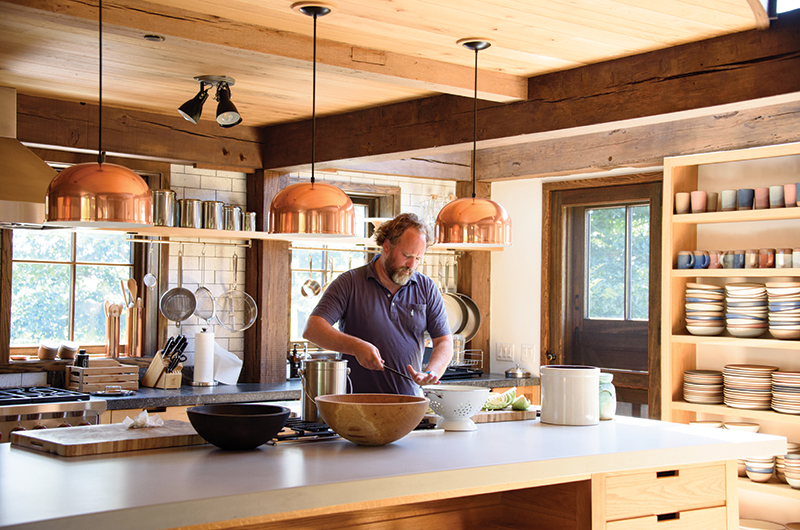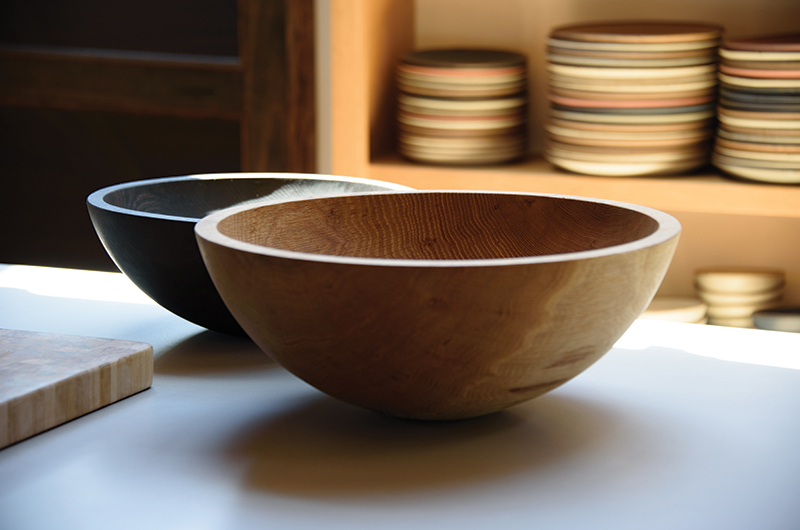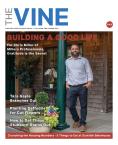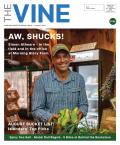What do a music major, chef, food stylist, Food Network culinary producer, culinary school instructor and Chilmark resident have in common? A name. Chef Charles Granquist, who prefers to be called Charlie, brings this varied background to his new position as culinary director at Slough Farm in Edgartown.
While Charlie’s adult life has been centered in Manhattan, he is no stranger to the Island; he spent childhood summers at his grandfather’s house in Chilmark. Working with food caught his interest even then: his first summer job was scooping ice cream at Mad Martha’s and later he learned to break down fish at Poole’s in Menemsha.
But his path to the kitchen took root in New York City, where his music background landed him a job at a sound branding company. Charlie quickly discovered his passion remained with food. “I started going to [restaurant] kitchens at night and asking, ‘Can I come chop some things and see what’s going on?’” he says.
Charlie left the desk job to enroll in culinary school, completing the professional program at the Institute of Culinary Education (ICE) in Manhattan. He cut his teeth at the esteemed Savoy with chef Peter Hoffman and then interned with chef Dan Barber of Blue Hill, known for his local, farm-to-table style. That was the pivotal moment in Charlie’s approach to cooking.
“All my cooking from then on has been hyperlocal,” Charlie notes. He helped to open Blue Hill at the Stone Barns Center for Food and Agriculture in Tarrytown, New York, learning the agricultural practices that drive chef Barber’s food.
Four years later and now married, Charlie left the grueling restaurant life for a culinary producer role at the Food Network. He worked as a food stylist and producer and then moved to the development side, bringing local food to Food Network restaurants in sports stadiums and airports across the U.S. After six years he was itching to get back to the kitchen and spent two years at Dickson’s Meats in the Chelsea Market, honing his butchery skills and learning to make charcuterie. Then another unexpected opportunity presented itself: a culinary instructor position at ICE.
“I had never taught before but I loved it,” Charlie says.
But more change was ahead. In 2018 Charlie, his wife Lauren Lynch and their two sons packed up their apartment in Brooklyn and moved to Martha’s Vineyard, landing at his grandfather’s house in Chilmark, just up the street from Beetlebung Farm.
The hardest thing about relocating to the Island? No takeout. “We had lived on takeout for years,” Charlie says, laughing, reflecting on the busy life of two working parents.
A chance encounter with a fellow dog lover on Lucy Vincent Beach led him to the chef position at the Katama General Store. “I took over the kitchen for three seasons, which was harder than anything I had done in New York City,” he says. The level of production was intense, working seven days a week for the hectic summer season. When Covid hit, Charlie helped create Covid protocols and taught the young staff skills like pickling.
“We got as local as possible,” he said.
When Lauren was hired as the executive director of the Martha’s Vineyard Agricultural Society, Charlie left Katama General Store and devoted time to their sons. After cooking for a music residency at Slough Farm, he was offered a permanent role. The position gives him plenty of space for inspiration: creating dinners for the foundation, cooking for the founders and working with the FARM Institute on educational initiatives are just a few of his responsibilities.
“We’ve been on a culinary hiatus for the past two years and unable to host visiting chefs because of Covid,” he says, something he hopes will change in 2023.
Charlie has Brooke Ditchfield, the former theater teacher at Martha’s Vineyard Regional High School, to brainstorm with, as she takes on her new role as program director.
“The main thing we strive for is food equity. Almost everything we grow we give to Island schools and the food pantry,” Charlie says. “Anything that [garden manager] Carla Walkis can’t give away, I will pickle and preserve.
Charlie’s dishes reflect his passion for local food with unexpected flavor elements: a recent farm dinner featured roasted pork shoulder, beets with coconut milk, and cabbage slaw with fish sauce and lime.
“I’m a reactionary cook,” Charlie says. “I react to what I can create from the ingredients I’m given more than anything else. I like to be told what I have. I’ll text Carla and ask what’s coming out of the garden this week and base the menu around that.”
Even the unforgiving winter months don’t deter his local approach: “I love the hyper-seasonality of cooking in New England,” he says. “I love the winter when the farmers are giving me pounds of kale and cabbage. It forces you to get even more creative.”
But Charlie’s focus for Slough Farm is on helping the local agricultural community and other Island chefs. “We’re committed to helping any other farms who need help. We can have things like soil seminars and gleaning seminars with Carla,” he says. “I can help cooks that want to learn how to cook seasonally and help young chefs. I’d love for this place to be a think tank, with young people coming in and working with farmers.”
Charlie points to the long history of agriculture on the Island as the basis for all of Slough Farm’s work. “This Island is historically such an agricultural hotspot and it’s been rejuvenated in the past 20 years, with younger farmers and then more chefs following the local approach to cooking,” he says.
At the intersection of sustainable farming and cooking, Slough Farm is an exciting spot for Charlie to write his next chapter in food.
Laura Holmes Haddad is a freelance writer living in West Tisbury.














Comments